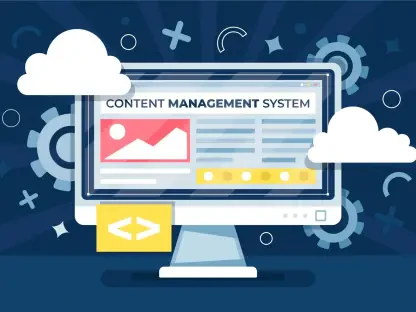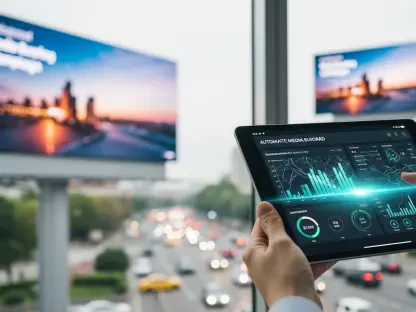Introduction to AI’s Role in SEO
In the rapidly evolving digital marketing landscape of 2025, a staggering 87.8% of businesses express deep concern over maintaining their online visibility as artificial intelligence (AI) reshapes the very foundation of search engine optimization (SEO). This seismic shift, driven by AI-generated responses overtaking traditional search results, poses both a challenge and an opportunity for companies striving to stay relevant. With user search behavior transforming at an unprecedented pace, the industry stands at a critical juncture, prompting a reevaluation of long-standing strategies to ensure businesses remain discoverable in this new era.
The integration of AI into search technologies is no longer a distant prospect but a present reality, influencing how consumers access information and make decisions. Businesses, especially in e-commerce and medium to enterprise-level sectors, are grappling with the implications of reduced organic traffic and the need to adapt swiftly. This report delves into the current state of SEO, the impact of AI on search dynamics, emerging challenges, strategic shifts, and the future outlook for maintaining online presence amidst these technological advancements.
The Current Landscape of SEO and AI Integration
The SEO industry in 2025 is undergoing a profound transformation as AI becomes an integral component of digital marketing frameworks. Search engines are increasingly prioritizing AI-driven answers over conventional results, fundamentally altering the mechanisms businesses rely on to attract and engage customers. This shift underscores the critical importance of adapting to AI technologies to maintain competitiveness in an environment where visibility equates to viability.
Key players in the market, including major search engine providers and tech innovators, are driving the adoption of AI tools that refine how content is indexed and presented to users. The influence of AI extends beyond mere algorithms, impacting user expectations for instant, accurate responses tailored to specific queries. As a result, companies must navigate a landscape where traditional ranking factors are being supplemented by machine learning models that prioritize relevance and context over keyword density alone.
The growing necessity to integrate AI into SEO practices is evident as businesses recognize that failure to adapt risks obsolescence. Investments in AI optimization are becoming standard, with many firms reallocating resources to understand and leverage these technologies. This adaptation is not merely a trend but a strategic imperative to align with evolving search behaviors and sustain a digital presence in an increasingly AI-centric world.
AI’s Impact on Search Behavior and Business Concerns
Key Trends and Shifts in Search Dynamics
User search habits are undergoing a dramatic overhaul due to the proliferation of AI-generated answers that often bypass traditional search engine result pages. This rapid transition means consumers are receiving direct responses from AI systems, reducing the likelihood of clicking through to business websites. Such a change disrupts the conventional customer journey, compelling companies to rethink how they position themselves in this altered digital ecosystem.
Businesses are voicing significant apprehensions about losing their online findability as organic traffic, once a cornerstone of digital marketing, faces potential decline. The fear of diminished visibility is compounded by the realization that AI responses may not always direct users to their platforms, threatening lead generation and sales pipelines. This shift is particularly concerning for industries reliant on search-driven discovery, where being overlooked could mean substantial revenue losses.
Moreover, the unpredictability of AI prioritization in search results adds another layer of complexity for marketers aiming to maintain a consistent online presence. Unlike traditional SEO, where strategies could be honed over time, AI-driven search introduces variables that are harder to predict or control. This uncertainty is pushing companies to explore alternative avenues to ensure they remain visible to their target audiences.
Survey Insights and Industry Response
A comprehensive survey of over 300 marketers and business owners reveals that 87.8% harbor serious concerns about sustaining online visibility in the face of AI’s growing dominance in search. Conducted among a diverse group predominantly from medium to enterprise-level firms, the data highlights a pervasive anxiety centered on the risk of becoming invisible to potential customers. This statistic paints a vivid picture of an industry on edge, seeking solutions to an unprecedented challenge.
In response to these fears, a robust 85.7% of businesses are either currently investing or planning to invest in optimization for AI and large language models to counteract potential visibility losses. Additionally, 61.2% of respondents intend to boost their SEO budgets over the next few years, signaling a proactive stance toward adapting to this new reality. These financial commitments reflect a determination to stay ahead of the curve in a rapidly changing digital environment.
The industry response also shows a strategic pivot, with many companies focusing on securing brand mentions within AI responses as a primary goal. This shift indicates a broader understanding that visibility, even without direct website links, holds significant value in maintaining consumer awareness. Such measures underscore a collective effort to redefine success metrics in alignment with AI’s influence on search outcomes.
Challenges in Adapting to AI-Driven SEO
Adapting to AI-driven SEO presents a host of challenges for businesses accustomed to traditional search methodologies. One prominent issue is the notably lower conversion rates from AI referrals compared to clicks originating from conventional search engine results. This discrepancy suggests that while AI may increase exposure, it does not necessarily translate into the same level of actionable engagement or sales.
Another hurdle lies in the difficulty of tracking traffic attribution in an AI-dominated search landscape. Unlike traditional SEO, where analytics provide clear insights into user pathways, AI-generated responses obscure the origin and intent of interactions, complicating performance measurement. Businesses are thus left grappling with incomplete data, hindering their ability to refine marketing strategies effectively.
Furthermore, there is widespread uncertainty about whether AI can match the effectiveness of organic search in driving meaningful results within the near term, specifically over the next couple of years from 2025. This doubt fuels hesitation among some firms to fully commit resources to AI optimization, creating a tension between maintaining established practices and embracing innovative approaches. The path forward requires navigating these uncertainties with a balanced perspective on risk and opportunity.
Evolving Strategies and Industry Terminology
As businesses recalibrate their approach to SEO in light of AI advancements, a notable strategic shift is occurring toward prioritizing brand visibility within AI-generated responses. Survey data indicates that 75.5% of companies value brand mentions over direct links to their websites, recognizing that awareness can be as crucial as immediate traffic. This focus represents a departure from traditional metrics, emphasizing long-term recognition over short-term clicks.
Alongside these strategic evolutions, new terminology is emerging to encapsulate the changing dynamics of SEO in an AI context. Terms such as “SEO for AI,” favored by 49% of professionals, and “GEO,” supported by 41%, are gaining traction as descriptors for this hybrid field. These labels reflect a desire to retain familiar SEO branding while acknowledging the distinct challenges and methodologies introduced by AI technologies.
The adoption of such terms also signifies an industry consensus on the need to adapt existing frameworks rather than overhaul them entirely. By integrating AI-specific concepts into the SEO lexicon, businesses and marketers aim to bridge the gap between traditional practices and cutting-edge innovations. This linguistic evolution mirrors the broader strategic adjustments underway as the industry seeks to redefine relevance in a transformed digital space.
Future Outlook for SEO in an AI-Driven World
Looking ahead, the SEO industry is poised to navigate a delicate balance between maintaining the efficacy of traditional organic search and embracing the potential of AI-generated responses. While AI continues to disrupt conventional search patterns, it is unlikely to completely supplant organic results in the immediate future, suggesting a hybrid model where both approaches coexist. Businesses must prepare for a dual-focus strategy to optimize outcomes across these parallel channels.
Potential disruptors, such as advancements in AI algorithms or shifts in consumer trust toward AI responses, could further reshape the landscape over the coming years. The importance of establishing a strong brand presence within AI systems cannot be overstated, as it may become a primary determinant of visibility. Companies that invest in building recognition now are likely to gain a competitive edge as these technologies mature.
Success metrics in digital marketing are also expected to evolve, moving beyond click-through rates to encompass broader indicators like brand sentiment and AI response inclusion. This redefinition will require marketers to adopt more nuanced measurement tools and adapt to a landscape where influence is as valuable as direct engagement. The future of SEO promises continuous evolution, demanding agility and foresight from all industry stakeholders.
Reflecting on Findings and Next Steps
Looking back, the exploration of AI’s impact on SEO revealed a pervasive concern among businesses, with nearly 90% worried about losing online visibility due to shifting search paradigms. The industry response was marked by significant investments in AI optimization and a strategic emphasis on brand presence, even as challenges like lower conversion rates and attribution difficulties persisted. This period highlighted a critical transition, where adaptation became synonymous with survival.
Moving forward, businesses should prioritize integrating AI optimization into their core SEO strategies, focusing on securing brand mentions within AI responses as a foundational step. Experimenting with emerging tools and frameworks tailored for AI search can provide a competitive advantage, while maintaining robust traditional SEO practices ensures a safety net during this transitional phase. Collaboration with technology providers to enhance tracking capabilities will also be crucial in overcoming current data limitations.
Additionally, a long-term vision should involve redefining success metrics to align with AI-driven realities, placing emphasis on sustained visibility and consumer perception. By fostering agility and investing in continuous learning, companies can navigate the uncertainties of this evolving landscape. The journey ahead demands a proactive stance, leveraging both innovation and resilience to redefine online presence in an AI-dominated era.









